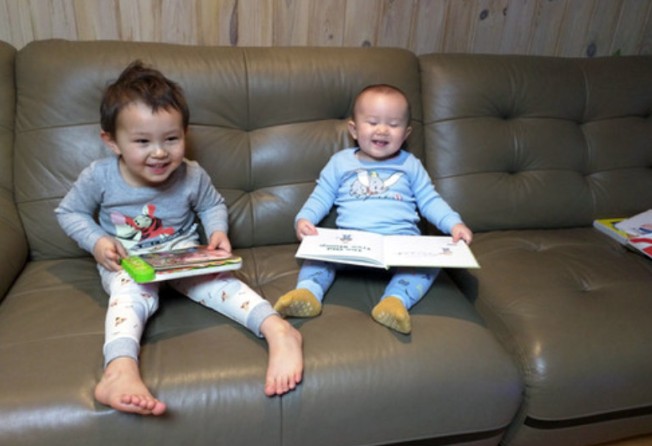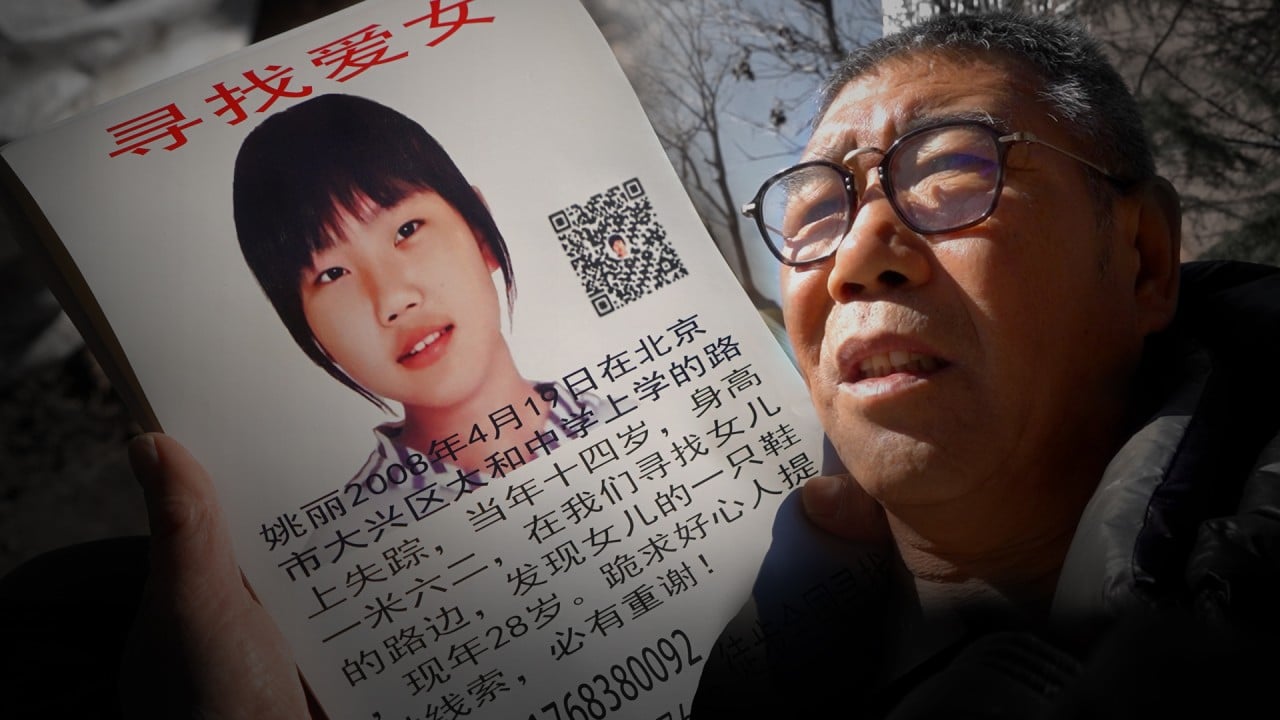
US father’s battle to find missing children in South Korea
- John Sichi’s ongoing treadmill protest in Seoul is part of desperate effort to find his missing children who have been allegedly abducted by his South Korean wife
- Sichi says South Korea’s flawed system has failed to support him after his wife absconded

On a cold afternoon on November 30, when temperatures nosedived to -7 degrees Celsius (19 degrees Fahrenheit) in Seoul, John Sichi walked on a treadmill in front of Dongdaemun Design Plaza. Undeterred by the biting winds, the US dad tread for nearly four hours.
Near the treadmill stood a placard reading: “Please let me see my children”, and a life-size cardboard cut-out of a five-year-old boy and three-year-old girl.
Curious passers-by approached him. A woman handed him 10,000 won (US$7.50), likely assuming it was a fundraising campaign.
Sichi has been staging the treadmill protest since October in various spots in Seoul, in a desperate effort to find his missing children who have been allegedly abducted by his South Korean wife.
His demand is simple: The government in Seoul should enforce court orders from both the United States and South Korea that the children should be returned to America.
Over the last couple of years, Sichi’s life has been tangled up in court proceedings over the international parental child abduction case by his spouse.
“I’m trying and trying, but I’m not able to reach [my children],” said Sichi. “Now I’m asking for help from anyone.”

A cross-border abduction
The 53-year-old software engineer from San Francisco married his South Korean wife in 2013 in the US, making her a permanent resident there. She gave birth to their son in January 2017, and then their daughter in December 2018. Both children obtained dual citizenship.
Wanting to become a stay-at-home dad, Sichi quit working. It was a happy family, he said, until some marital conflicts arose, resulting in his wife taking their children to South Korea in November 2019.
“It was not a happy marriage at that point,” Sichi admitted. “But it was a normal kind of situation, like those that arise due to cultural differences, which can happen in any other international marriage.
“She said she wanted to take some time to cool off with her family. So I said, ‘OK, but you need to come back because this is our home here and the kids’ home’.”
But the three never returned.
Sichi came to Korea in December 2019 and then again in January 2020, to persuade his wife to bring the children back to San Francisco. She had initially agreed, but at the end of February, she abruptly cancelled the plane tickets for herself and the children.
Following his wife’s refusal to negotiate, Sichi took the case to the courts in his home country. As a result of a months-long trial at the San Francisco County Superior Court, in which his wife took part via phone from Korea, in August 2020, the court ordered the children be returned to the US – their habitual residence.
His wife did not comply. The US court then assigned sole legal and physical custody to Sichi and authorised him to travel to Korea to retrieve his children.
In November 2020, Sichi filed a request to the Seoul Family Court for the return of his children under The Hague Convention on the Civil Aspects of International Child Abduction (HCCAICA), accusing his wife of international parental child abduction.
International parental child abduction refers to the removal or retention of a child outside their country of habitual residence in breach of another parent or guardian’s custody rights.
The Hague Convention is an international treaty aiming to protect children from international parental abductions among party countries, by encouraging the prompt return of the children to their country of habitual residence. South Korea ratified the treaty in 2012 and stipulated related laws the following year.
Six months after Sichi’s complaint, the Seoul Family Court ordered the immediate return of the children in accordance with The Hague Convention. The appellate and Supreme Court also sided with Sichi, dismissing the appeals filed by his wife.
However, his wife still did not comply with the Supreme Court order. The court sentenced her to a fine of 500,000 won in July this year and then to a 30-day detention as she continued to resist.
Since then, she has gone missing along with the children.
“I believe they are hiding somewhere in Korea, I hope they haven’t flown away,” said Sichi, explaining that he has been unable to locate them due to a lack of proper support from police and the government.
“Children aren’t objects. You don’t steal children, but time is something you can steal. Their time has been stolen,” he added, expressing concern for his children, who are cut off from their father and their American heritage.
The Korea Times reached out to Yulchon law firm, the legal representative of Sichi’s wife, to hear her version of the story. But they were not available for comment.
“It is difficult to comment about the matter since it is an ongoing case,” said an official at the law firm.

Flawed system
Sichi argues that South Korea’s flawed system is failing to support him. His demand for the government to comply with The Hague Convention ― to find the children and carry out direct court enforcement so that they can fly back to San Francisco ― has not been met due to weak mechanisms, he said.
“The narrative here is not a ‘husband versus wife’ story but a father against a broken system,” he said.
In May this year, court officials, accompanied by Sichi, went to his wife’s flat to execute the court order. But they could not retrieve the children due to the strong resistance of the mother, and also because their children did not consent to be separated from their mother.
Min Ji-won, a lawyer at IPG Legal, Sichi’s legal representative, said the court order was exercised in a stressful environment for the young children.
“On that day, there were no child psychologists, no child protection services. The court officials didn’t give Mr Sichi a proper chance to talk with the children to explain his side of the story while their mother was yelling at us. The kids were in fear and didn’t seem to have a clue about what was happening,” she said.
In November, Sichi filed a police report to search for the missing children. The police officers only verified the safety of the children, with whom they met under the presence of their grandmother (not Sichi’s wife), but did not specify their location.
“Since this is a civil case, I understand that the law enforcement authorities cannot actively conduct an investigation. But what I don’t understand is the lack of the justice ministry’s efforts to find the children and carry out The Hague Convention,” Min said.
The Ministry of Justice is the government body overseeing affairs on international parental abduction cases under The Hague Convention.
The lawyer said she and her client are considering whether to file a criminal complaint against the children’s mother on charges of child abduction, which would enable police to launch an intensive search.
The justice ministry, for its part, told The Korea Times that it was doing its best to support Sichi in retrieving his children, in accordance with legislation regarding The Hague Convention.
“We are holding high-level talks with our US counterparts to strengthen cooperation on the matter. We are having regular meetings since the first one was held in Washington on June 24,” the ministry said in an email.
As to why the ministry has not been able to locate the children, it explained, “identifying the actual whereabouts is the role of the police and related probes are conducted in accordance to their rules. But as this is not a criminal case, and thus not subject to compulsory police investigations, it may be difficult to locate them.”
The ministry added that it would come up with improvement measures to execute court orders, as indirect ways of enforcement ― sentencing fines and detentions ― have so far been ineffective.

US lists Korea as non-compliance country on Hague Convention
As Sichi’s case remains far from being resolved, the US State Department recently included Korea on a list of countries that are non-compliant with The Hague Convention, along with 10 other nations including Brazil, Ecuador, Honduras and Romania.
The annual report on international child abduction released in September said, “In 2021, the Republic of Korea showed a pattern of noncompliance. Specifically, Korean law enforcement authorities regularly failed to enforce return orders in abduction cases.”
It added: “While courts in the Republic of Korea ordered the return of children under the Convention, decisions for return were generally not enforced, including one case that was pending for more than two years as of December 31, 2021.”
Moreover, Michelle Bernier-Toth, a special adviser on children’s affairs at the US State Department, arrived in Seoul on December 4, to meet the Korean authorities to address the case, according to the US embassy in Korea.
“Preventing and resolving cases of international parental child abduction (IPCA) is one of our top priorities. The Department engages actively with parents, stakeholders, and countries across the globe, to identify, resolve, and prevent IPCA cases,” an embassy official told The Korea Times in an email, confirming Bernier-Toth’s visit from December 4 to 6.
Sichi, who met Bernier-Toth on Monday to discuss his case, said the US authorities are urging the Korean government to speed up the process. The special adviser met her counterparts at the justice and foreign ministries as well as the Supreme Court.
“There was also a lawyer from the State Department, an international law expert, present at the meeting [on Monday]. I guess they are trying to pinpoint where Korea’s domestic laws are incompatible with The Hague Convention,” he said.
This article was first published on The Korea Times.
